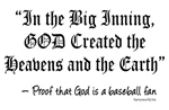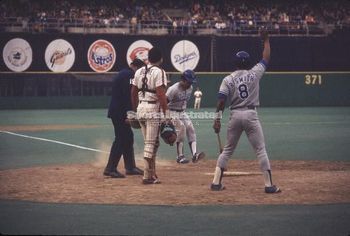Of course, the team still had the great Steve Carlton (23-10, 2.64, 198 Ks, 17 CG)- on his way to his second Cy Young Award. While the rest of the starting staff was marginal at best, they did get 19 wins from Larry Christenson and big performances on occasions from Jim Lonborg and Jim Kaat. The bullpen had a solid trio of Gene Garber, Ron Reed and Tug McGraw who made up for some of the shortfalls of the back of the starting rotation.
Regardless of any questions of the starting staff, this was a very good baseball team. They made their first postseason appearance since 1950 a year earlier. They just so happened to run into the Big Red Machine on Cincinnati's way to their second consecutive World Series Championship. But 1977 seemed different. The Reds had stumbled through a down season and won only 88 games, leading the way for the Los Angeles Dodgers to win the NL West Division. The Dodgers had a very good team themselves, but the Phillies were the favorites in the NLCS.
The Phillies got off to a good start in game 1, taking a 5-1 lead into the 7th inning with their ace Carlton on the mound. Unfortunately, he was unable to hold the lead as Ron Cey hit a grand slam off him to tie the score. However, in the 9th inning, the Phillies scored a run on a Schmidt single and another on a balk in route to a 7-5 victory. Game 2 seemed like a long shot off the bat, as Longborg didn't have his stuff and was out by the 5th inning, down 5-1. What made matters more difficult was the fact that Don Sutton was pitching well and would go the distance in a 7-1 victory.
The setting was set for game 3, where the NLCS shifted to Philadelphia. The Phillies were in the driver's seat after getting a split in LA. The next three games were to be played in Philadelphia, due to the standard 2-3 LCS format. The pitching matchup was Burt Hooton against Christenson. The Dodgers opened the scoring with 2 in the second. The Phillies followed with three of their own, chasing Hooten as he was relieved by Rick Rhoden. After the Dodgers tied the game in the forth, the score remained tied until the Phillies came to bat in the 8th inning.
The Phillies got to the struggling Elias Sosa in the 8th inning, scoring a run on a Garry Maddox single and another thanks to a throwing error by Cey. The Phillies were up 5-3 with their top relief pitcher in the game in Gene Garber. Garber had pitched two scoreless innings of relief, retiring all 6 batters he faced. And Garber would retire the first two batters to face him to start the 9th inning.
The setting is set- 2 outs, nobody on- up 5-3. Tommy Lasorda calls catcher Steve Yeager back and sends up Vic Davalillo. Davalillo is a veteran who has become a very reliable pinch hitter for the Dodgers, even though he had not played in the big leagues in 1975 and 1976. Davalillo laid down a bunt and beat it out for a hit. Manny Mota, who has long been considered the greatest pinch hitter of all time, would be up next to bat for the pitcher. Mota would hit a double to score Davalillo and advanced to third on a dropped relay to second baseman Ted Sizemore. Davey Lopes reached on an infield hit scoring Mota to tie the game. Then the Phillies had an chance to end the inning as Garber had Lopes picked off first. Had he not made an errant throw, the Phillies would have gotten out of the inning with the game tied. And if that happened, they would have had a chance to win the game with a run in the bottom of the 9th inning. Instead, the throwing error moved Lopes into scoring position. Bill Russell's single up the middle gave the Dodgers the lead.
The Phillies, who seemed shell shocked after the events of the last inning, seemed to have nothing to challenge reliever Mike Garman. With two outs and nobody on, Garman hit Luzinski before retiring Richie Hebner on a ground ball to end the game. Had the Phillies held on and won game 3, the series could have been theirs. Game 4 went to the Dodgers as Tommy John out dueled Carlton, winning 4-1 and the series 3-1. Had the Phillies been up 2-1 after 3, I truly believe the series would have been different. And who knows, maybe the Phillies match up better against the Yankees. I still think 1977 was the Yankees season, but there would have been some intrigue in the rematch of the 1950 Series when the Yankees swept the Phillies. But the truth is, the Phillies still had to win another game, which they ultimately did not do.
Looking over the video of the Dodgers half of the 9th inning of this game, I have some issues with the official scoring on three particular plays. Obviously, the scoring of the plays have nothing to do with the outcome of the game, but I think the scoring of the plays better tells the story of what happened. Of course, the failed catch by Luzinski was a huge play in the inning. It was correctly scored a double off the bat of Mota, but I feel the scorer was too quick to rule an error on the throw to second that allowed Mota to get to third and possibly Davalillo to score. The error was given to Sizemore, but I feel it should have been given to Luzinski on the throw. Second was the infield hit by Lopes. This is the classic "hometown scoring" by declaring that an hit. Yes, it was a tough play for Schmidt, but the fact is it deflected off him to the SS and should have been scored an error. The official scorer didn't want to punish the man who had already made some great plays to save runs throughout the series. Finally, on the pick off play to first that resulted in Lopes going to second- I don't see why it was such a sure thing that Lopes was going to be out on the pick off throw by Garber. Yes, the error allowed Lopes to reach second but I would not have awarded a pick off because there is no proof he would have been out on a good throw. Going back to the Lopes "hit," using the super slow motion replays we have now could have proven that he was out. But if he was out, it was by a millimeter.


 RSS Feed
RSS Feed
